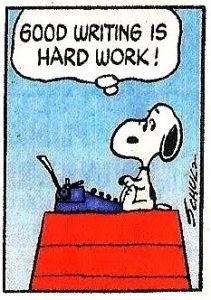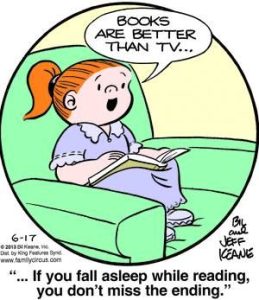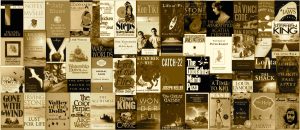Writing is hard work. Don’t let anybody tell you otherwise. I think most non-writers think that when authors sit at their computers (or for some, at their typewriters) the words just fly onto the written page. They don’t. Sometimes getting words onto the page is like trying to squeeze the last bit of toothpaste out of the tube. It can be excruciating. As Ernest Hemingway once said: “There’s nothing to writing. You just sit at your typewriter and bleed.”
So, that’s one myth busted. Another is that all authors are wealthy, especially when they get a book published. Ha! That’s a laugh. Okay, there is a tiny percentage who do make millions when they hit the publishing lottery and produce a book that is a blockbuster.
As you will see from the survey data that follows, writing is NOT going to make you rich. Having said that, I will say it is an immensely satisfying activity, especially if you write fiction because you are creating something out of nothing. Well, not exactly nothing. You must generate the story in your mind and then transfer it to the written page, hopefully in a compelling way. Many writers who never hit the blockbuster jackpot make a decent, if not bountiful living.

I am a member of the Authors Guild, which is America’s oldest (since 1912) and largest (12,000 members) authors’ organization. As an author who has been both traditionally published by one of the “Big Five” publishers and who has, like a growing number of today’s authors, utilized small, independent presses or self-published, I found the survey fascinating and revealing.
For the writers who follow my blog, I am posting the survey as a public service because I believe writers will find it enlightening. For non-writers, it will blow up abundant myths about the writing profession.
Please read on:
The following summarizes the results of the Authors Guild Income Survey and puts the data in context.
- The largest survey of U.S. professional writers ever conducted, generating data from 5,067 published book authors (84 respondents are not currently based in the U.S., but are U.S. citizens living abroad or Canadians selling in the U.S. market).
- Participating organizations: The Authors Guild and the 14 other writers’ organizations listed below participated, as well as several independent publishing platforms:
Authors Guild, Romance Writers of America, Society of Children’s Book Writers, Sisters in Crime, International Thriller Writers, Textbook and Academic Authors Association, National Association of Science Writers, American Society of Journalists and Authors, Association for Garden Communicators, Independent Book Publishers Association, PEN American Center, Authors Alliance, Next Big Writer, B&N Press, Authors Registry, Ingram Spark, Reedsy, and Lulu.
- Survey dates: The survey was fielded from June 7 to August 21, 2019, to give all participating groups a chance to get it to their members.
- Incentive: Participants had the option of entering a drawing for 100 $50 Visa gift cards.
- Completion rate: Of those who started the survey, 55% completed it out of 9,288 starting participants, far lower than the 74% who completed the 2015 Authors Guild member survey—due to concerns about hacking, the ISBN stratification question, and increased privacy concerns in today’s digital environment.
- Survey respondents’ demographics: Of authors who responded,
- 53% consider authoring books their primary occupation, spending half or more of their work time writing.
- 56% write fiction.
- 18% write literary fiction.
- 38% write genre fiction.
- 22% are academic, scholarly, or textbook authors.
- 18% write general nonfiction.
- 9% publish books to advance their work or personal brand (thought-leadership).
- 46% traditionally published; 27% self-publish only; and 26% do both—meaning that slightly more than half of the respondents have done some self-publishing.

- CRISIS OF EPIC PROPORTIONS FOR AMERICAN AUTHORS, PARTICULARLY FOR LITERARY WRITERS
- The median incomes of all published authors who were surveyed—including part-time, full-time, traditionally published, self-published, and hybrid-published authors—for all writing-related activities was $6,080, down 3% from four years ago. This is down from a $10,500 median income in 2009 according to the Authors Guild’s last survey. Worse still, the median income for all published authors based solely on book-related activities fell from $3,900 to $3,100, down 21%, while full-time traditionally published authors earned $12,400.
- The median income for full-time authors for all writing-related activities, however, was $20,300 in 2017, up 3% from 2013. Note, however, that is still considerably lower than the $25,000 median income full-time authors earned in 2009.
- Literary writers experienced the biggest decline (down 27% in four years) in the amount they earned from book-related income, followed by general nonfiction (down 8%), raising serious concerns about the future of our literary heritage—of books that teach, inspire, and make us think and empathize.
- Roughly 25% of all authors surveyed earned $0 in book-related income in 2017; 18% of full-time authors earned $0 in book-related income during the same time period. This is likely because of the decline in ongoing royalties for previously published work and the decreased ability to receive a decent (or any) advance for the next book.
- SELF-PUBLISHED WRITERS HAVE SEEN INCOMES RISE, BUT THEY STILL EARN LESS THAN TRADITIONALLY PUBLISHED AUTHORS
- While self-published authors were the only group to experience a significant increase (up 95% in book-related income from 2013 to 2018), self-published authors as a whole still earned 58% less than traditionally published authors in 2017.
- Among the authors surveyed who ranked in the top decile for author-related earnings, self-published authors earned 50% less with a median of $154,000 compared to traditionally published authors in the top decile who earned a median of $305,000. Note that the median 2017 author-related income of $10,050 for self-published romance and romantic suspense writers is almost five times higher than the $1,900 median author-related income for the next highest-earning self-published genre category of mysteries and thrillers.
- Moreover, the median author-related income for self-published romance and romantic suspense writers was only $50 more in 2018 than in 2013, which may indicate that self-published romance writers as a group have reached a plateau for earnings under current business models.

- FULL-TIME MID-LIST AND LITERARY WRITERS ARE ON THE VERGE OF EXTINCTION
More book authors, even those who consider themselves full-time writers, are forced to hold down multiple jobs to earn enough money to survive. This includes authors who have written books for decades and have survived on their writing in the past.
- Inability to earn an adequate living: indeed just 57% of full-time published authors derived 100% of their individual income from writing-related work in 2018, and much of that writing income comes from activities such as speaking engagements, the teaching of writing, editing, or translating the works of other authors, ghostwriting, etc. rather from book advances and royalties. Only 21% of full-time published authors derived 100% of their individual income from book-related income.
- Pulled away from book projects to focus on paying gigs means literary authors are writing and publishing less often.
- As the number of newspapers, magazines, and literary journals continue to decline, there are fewer opportunities to supplement income with commissioned journalism or literary pieces (short stories, essays, poems, etc.). Indeed, the number of full-time newspaper and magazine journalists has declined by more than 60% since 1990 according to the Bureau of Labor Statistics.

- Pay professional writers receive to create blog posts and other online content generally translates to well below the hourly minimum wage, despite the fact that 52% of the published writers surveyed have advanced degrees compared to 11% of the general population.
- It takes writers longer to research and write books since they have to do it between other money-earning ventures.
- The quality of books written by authors holding down other jobs may be affected since their attention is divided and writing is often pushed to what spare free time is left.
- Authors on average spend 7.5 hours every week on marketing and promoting their books, an increase of 14% (genre writers up 39%) over the past five years; yet only 8% of all published authors realized a significant increase in book-related income.
- AMAZON FACTOR PLAYS A LARGE ROLE
Amazon dominates the book industry, both as a seller of books and as a publishing house. According to Codex’s November 2018 National Book Buyer survey, Amazon owns 72% of the online retail book market, which includes both eBook and print books, and nearly 50% of all new book units sold in the U.S. according to Amazon’s Annual Reports. Its control of so much of the retail market for publishers and for self-published authors affects authors in multiple ways:
- Democratizes publishing: On the upside, more people are writing and publishing books than ever before. Indeed, 33% of those surveyed published their first book in the past five years, and the number of authors self-publishing books rose by 72% since 2013.
- The growth of online subscription programs like Kindle Unlimited, which had a couple of million subscribers in 2018, for which subscribers pay $9.99 a month to access as many ebooks as they want, draws in the big genre fiction readers and results in them buying fewer books.*
- Fiction sales moving to Amazon: Among the traditional book publishers tracked by AAP, fiction books sales declined by 16% and overall ebook sales declined 36% between 2016 and 2017, but Amazon experienced an increase of 21% and 43% respectively. An increasing amount of fiction book sales, especially genre fiction, has moved to Amazon.

- Self-publishing is at the mercy of Amazon. Seventy-six percent of self-published authors in our survey used Amazon platforms, including Kindle Direct, Create Space, and ACX. While some authors are doing better self-publishing than they could be through traditional publishing, our survey shows that the overall median income for self-published authors averages 50–58% less than for traditionally published ones. Authors who self-publish with KDP Select and receive the marketing benefits that come with it, such as the ability to offer free books for five days, are required to take part in Kindle Unlimited (KU) and accept payments from the pool for reads through KU. KDP Direct authors get a royalty of only 35% if they price their books above $9.99 (compared to 70% for books priced at $2.99–9.99), contributing to authors’ losses and giving Amazon a windfall on books that are expensive to produce.
- Amazon’s dominance pressures publishers. Amazon (which now controls 72% of the online book market in the U.S.) puts pressure on them to keep costs down and takes a large percentage, plus marketing fees, forcing publishers to pass on their losses to authors. (Other than marketing which they are cutting, advances and royalties are the one negotiable line in their P&Ls.)
- PUBLISHERS’ BLOCKBUSTER MENTALITY, 25% EBOOK ROYALTY RATE, AND INCREASE IN DEEP DISCOUNTING ADVERSELY IMPACT AUTHOR INCOMES
- Blockbuster mentality: While mainstream publishers enjoy the cachet and increased sales that stem from publishing award-winning authors, in general, they remain risk-averse, chasing “blockbuster” and celebrity authors. To land and keep these top-selling authors, publishers are forced to pay six-figure advances and then spend enormous resources promoting these books to recoup the huge out
 lays. This leaves fewer resources for mid-list writers—the 90%—where most literary fiction and non-fiction authors reside.
lays. This leaves fewer resources for mid-list writers—the 90%—where most literary fiction and non-fiction authors reside.
- Royalties: Royalties are down for most authors by 11% compared to 2013 data. We hear many complaints from authors, even those with best-selling books, that they are receiving little to no royalties. We suspect the reasons are:
- An increase in the number of second-hand books sold by Amazon resellers at lower costs than the publisher’s royalty-bearing copy furnished by Amazon. More and more sales are going to the reseller market and not to the publisher. There can be dozens of copies available cheaply from Amazon; often hardcover copies are available at lower prices than the paperback.
- Increased use of deep discounts. Most publishing contracts provide a very reduced or no royalty if books are sold at discounts over 55%.
- Publishers generally settled at the 25% of net rate for ebooks, which provides the author a much lower amount per book sale than hardcover books.
- The perennial problem of book store returns; these are put back into the market and compete with new royalty-bearing sales.
- This is an area the Guild will be researching further. We will gather data from members and other organizations’ members for future studies.
- Increased competition: Bowker reports more than 1,000,000 books were published in the U.S. in 2019 (up from 300,000 in 2009); two-thirds of those books are self-published.
- Small literary publishers and university presses lack significant resources: While small publishers and university presses continue to support and enhance American culture and an understanding of our world by publishing emerging literary writers and nonfiction books by academics, both have limited resources to pay advances and promote books, and in general, can only publish a small number of titles per year. Of the 73% of the authors surveyed who publish with a traditional publisher, 54% are with a small to mid-size house.
And there you have it–an incredibly comprehensive look at the worlds of authors and publishers. Will the rather disappointing data stop me from writing? No way.
Most writers are pretty resilient when it comes to the mutilation of their egos. Most just keep plugging away, putting words on pages for the pure enjoyment of it. Others do so in the hope that they are writing the next great American novel or on the yellow brick road to a Pulitzer Prize.
Me? I just love to write. It’s something I have done all my life–first, as a Chicago Tribune foreign correspondent, then as a professor and dean at the University of Illinois, and now as a novelist in Southern California.
Serva scribentes!


I wonder which is more depressing—Bezos’ effect on the literary scene via Amazon or his effect on the political scene via The Washington Post.
I am ambivalent about Amazon. In one way it hurts authors–especially the Kindle Unlimited deal. In another, it gives authors whose work would never see the light of day a platform. The Post is a different story. No ambivalence there. It’s a socialist rag.
True about the democratization of the literary platform, but he hasn’t done much to help independent bookstores.